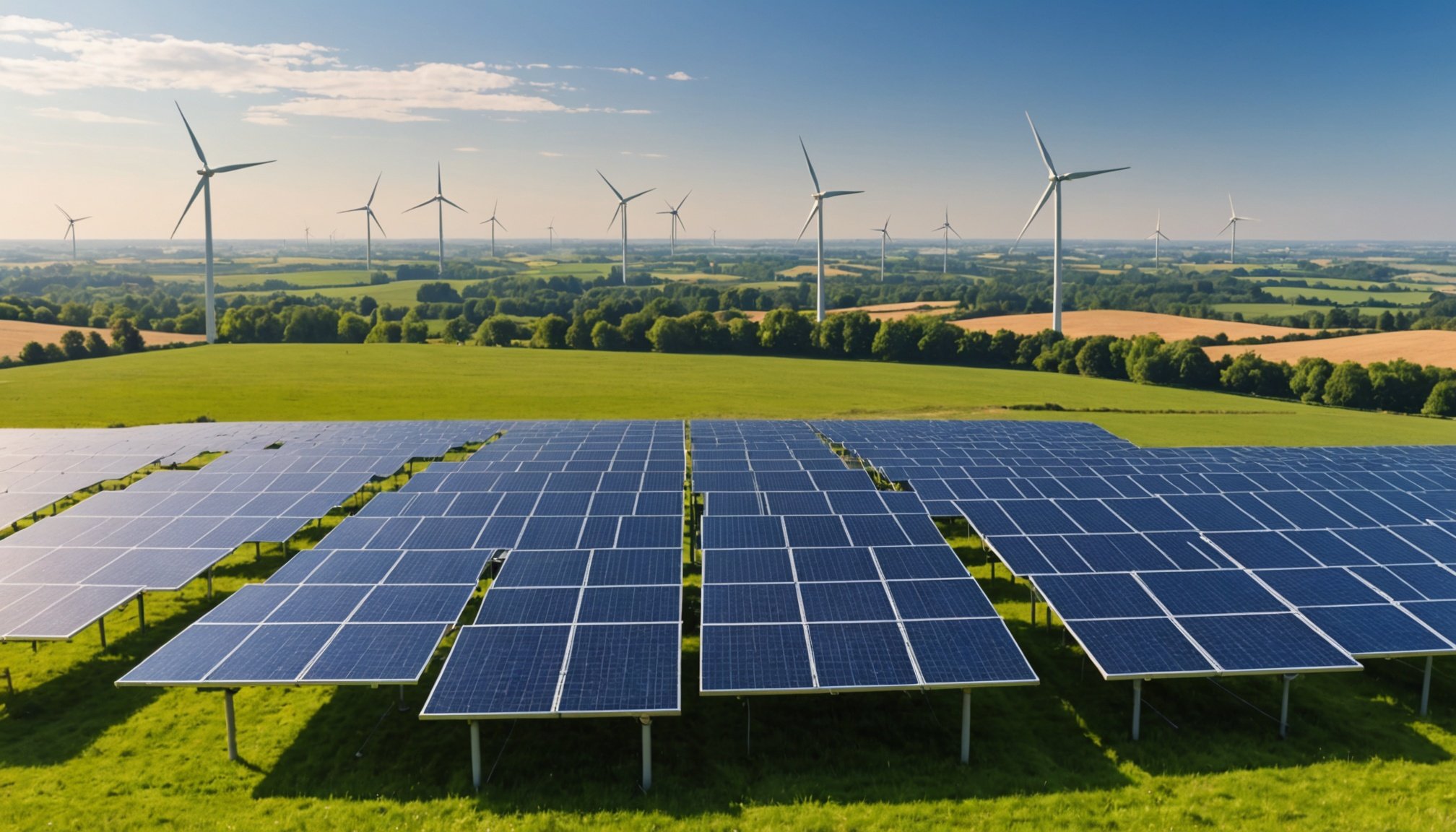Overview of Legal Frameworks for Renewable Energy in the UK
Navigating the renewable energy sector in the UK requires a comprehensive understanding of its legal frameworks. These frameworks are pivotal in facilitating sustainable energy initiatives. At the heart of these efforts are key renewable energy laws such as the Climate Change Act and the Energy Act. They provide the statutory backdrop for reducing carbon emissions and fostering clean energy technologies.
The UK government has established several regulatory bodies to oversee compliance with these laws. Ofgem, the Office of Gas and Electricity Markets, is one of the primary bodies. It functions to ensure fair competition and protect consumer interests. Meanwhile, the Department for Energy Security and Net Zero devises policies for energy security and innovation in renewables.
Also read : Essential Legal Factors UK Businesses Need to Know About Biometric Authentication
Adhering to these legal frameworks is crucial for any business or entity involved in the renewable energy sector. Compliance not only ensures operational legitimacy but also aids in mitigating potential risks associated with legal violations. This highlights the essential role of legal advisors who possess expertise in UK regulations. They provide guidance on navigating complex laws and help in aligning projects with legal expectations, thereby enabling smoother execution of renewable energy projects. Understanding these legal and regulatory dimensions is key to advancing sustainable energy solutions in the UK.
Permits and Licensing Requirements
Navigating the permits and licensing landscape for renewable energy projects involves understanding various types of permits crucial for compliance. These generally include land-use permits, environmental permits, and building permits. Each type serves a specific purpose, such as ensuring safe and responsible use of natural resources or confirming structural safety.
In parallel : Mastering legal compliance: key tactics for uk companies transitioning to cloud-based hr solutions
Once you’ve identified the permits needed, the next important step is adhering to a step-by-step compliance process. Begin by consulting with local authorities to understand specific requirements. Gather needed documentation which may include environmental impact assessments or technical specifications. Submit these to the relevant regulatory body. Finally, be prepared for an inspection process where officials verify compliance with stipulated standards.
Local regulations often significantly impact the licensing process. For instance, certain areas may have specific zoning laws that might restrict renewable energy installations like wind turbines. It’s important to consult with local bodies to understand such constraints.
To ensure smooth progress, consider these steps:
- Conduct preliminary research on local guidelines.
- Engage with professional consultants for expert advice.
- Regularly update your project plans to reflect regulatory changes.
Bringing a renewable project to life is exciting but requires careful planning and adherence to permits and licensing requirements.
Environmental Regulations and Sustainability Obligations
Navigating the maze of environmental regulations is crucial for any renewable energy project. These regulations are designed to minimise ecological impact and promote sustainable development. Environmental Impact Assessments (EIA) are one of the primary requirements that must be met. Each project must undergo an EIA to evaluate potential effects on the environment, ensuring that the development aligns with sustainability standards set by authorities.
Most frequently, Environmental Impact Assessments necessitate a comprehensive analysis of the proposed location and its ecological sensitivity. This includes evaluating wildlife habitats, water resources, and local vegetation. But what exactly are the steps involved in an EIA? Initially, the assessment identifies all possible impacts, followed by public consultations to gather feedback, which then inform the final report and mitigation strategies.
Emphasising best practices can further aid in meeting sustainability obligations effectively. This involves not only adhering to current environmental regulations but also continually updating practices according to new sustainability standards. Whether it’s adopting innovative technology to reduce carbon footprints or improving energy efficiency, the focus is consistently on balancing development with environmental preservation. For developers, understanding and implementing these obligations is imperative in achieving the dual goals of project success and sustainable stewardship.
Contracts and Agreements in Renewable Energy Projects
In the realm of renewable energy projects, understanding and crafting contracts is vital. One of the cornerstone agreements is the Power Purchase Agreement (PPA). This contract outlines terms between the energy producer and the buyer, ensuring financial viability for the project by setting pricing, duration, and capacity commitments.
Negotiating contracts in renewable energy holds immense importance. It’s crucial to align business objectives while safeguarding interests. Through careful negotiation, parties can address issues such as liability, performance standards, and dispute resolution mechanisms. This process often determines project success, requiring meticulous attention to detail and a deep understanding of market dynamics.
With the complexity of legal obligations, many businesses encounter common issues in contract management. Misunderstanding liabilities or compliance requirements can lead to legal pitfalls, impacting project timelines and costs. It’s advisable to enlist expertise to navigate these challenges, avoiding ambiguous terms or incomplete agreements that could result in conflicts or inefficiencies. Therefore, ensuring thorough comprehension and diligence during the contract drafting phase is essential for fostering robust projects that stand the test of time.
Challenges and Risks in Navigating Legal Compliance
Navigating legal compliance in renewable energy initiatives can be complex, with potential legal challenges arising at various stages. Key issues often stem from inconsistencies in regulations across jurisdictions, which can confuse companies looking to comply. Additionally, evolving environmental laws may create obstacles, as businesses must stay updated and adapt to new requirements. Understanding these dynamic legal landscapes is critical to avoiding violations and ensuring successful operations.
To tackle compliance risks, businesses should consider embedding risk management strategies into their strategic planning processes. These strategies could include regular legal audits to stay abreast of regulatory changes or developing comprehensive compliance programs tailored to their operations. Appointing a dedicated compliance officer can also help monitor and implement these practices, ensuring the company aligns with applicable laws.
Examining case studies of businesses that have faced and overcome legal obstacles provides valuable insights. For example, some renewable energy companies have successfully navigated complex legal terrains by engaging with regulators early in their project cycles. This proactive approach can help identify potential compliance risks and formulate solutions before they become significant issues. Through strategic planning and diligent risk management, companies can prepare for and overcome the legal challenges they face in the renewable energy sector.
Resources and Support for Legal Guidance
Navigating the landscape of legal frameworks around renewable energy can feel complex. Understanding government regulations and seeking expert consultation can ensure compliance and maximise potential benefits. First, it is essential to access a list of government resources tailored to renewable energy legislation. These resources often include official websites, publications, and toolkits that provide up-to-date information.
An equally crucial step is consulting with legal experts who specialise in renewable energy. These professionals can offer detailed insights into specific regulatory requirements, policy changes, and potential legal obstructions that may impact projects. Leveraging their expertise helps avoid missteps and ensures projects remain on a legally sound footing.
Moreover, engaging with community and industry networks serves as a vital support pillar. These networks facilitate knowledge sharing and foster collaboration between stakeholders involved in renewable energy initiatives. Joining forums or online groups dedicated to renewable energy can provide access to shared experiences and advice, creating a supportive learning environment.
Whenever embarking on renewable energy projects, a well-informed approach via robust legal resources and strong community backing is indispensable. Accessing government guidelines efficiently, combined with timely expert consultation, empowers stakeholders to make informed, confident decisions.
Case Studies of Successful Compliance in Renewable Energy
Examining case studies of renewable energy projects in the UK reveals how successful compliance has paved the way for innovative developments. These successful projects are not only exemplars of sustainability but also illuminate the critical role of compliance in renewable energy sectors.
One notable example involves off-shore wind farms, which have demonstrated remarkable compliance with environmental regulations. By adhering to strict guidelines, these projects have significantly reduced their ecological footprint, ensuring harmony between energy production and environmental conservation. These compliance examples highlight the importance of abiding by legal requirements, serving as blueprints for future endeavours.
Lessons learned from these case studies emphasize the significance of collaborative efforts between project developers and legal experts. Comprehensive legal support has been instrumental in navigating complex regulatory landscapes, ensuring projects meet all necessary criteria. This support has maximized efficiency and minimized potential legal bottlenecks, impacting project success positively.
In solar energy, compliance with zoning laws and building codes has been crucial for development. These structured approaches exemplify how regulation can coexist with innovation, resulting in a robust framework that benefits all stakeholders. Compliance examples show that achieving the right balance between regulation and project goals can lead to successful renewable energy adoption.
Future Trends and Legal Developments in Renewable Energy
The renewable energy sector is on the cusp of significant legal developments that will shape its trajectory. Today, understanding emerging legal trends is paramount for stakeholders aiming to thrive in this dynamic market. Legal frameworks are increasingly aligning with environmental goals, promoting the adoption of sustainable practices.
One key trend is the move towards stricter environmental regulations. Governments are implementing policies that mandate reductions in carbon emissions, altering the renewable energy outlook. Future regulations are expected to impose more rigorous compliance needs, requiring businesses to adopt cleaner technologies and pursue energy efficiency.
To remain competitive, it is crucial for companies to stay informed about these changes. Forward-thinking predictive measures include monitoring policy shifts and understanding regulatory impacts on current operations. This proactive approach enables organisations to adapt seamlessly, capitalising on opportunities that align with sustainable practices.
For example, understanding new incentives for cleaner technologies can guide investment strategies, while awareness of data reporting requirements can prevent compliance-related penalties.
Ultimately, keeping abreast of legal developments ensures that businesses not only meet regulatory requirements but also position themselves as leaders in a transforming industry. The ongoing evolution of future trends promises to create a more resilient, sustainable energy landscape that aligns with global environmental goals.











